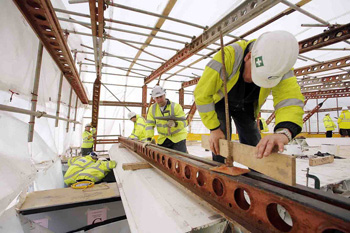If you are the sort of person who enjoys a hands on approach to overseeing building projects, then perhaps a career in construction engineering is for you. Construction engineering involves designing, planning, constructing, and managing a variety of construction projects. These professionals often oversee the building of highways, airports, bridges and railroads, as well many different types of buildings.
Construction engineers are unique because their role can be described as a hybrid one, and a cross between civil engineering and construction management. Construction engineers must learn many designing aspects the same as civil engineers do, and they are often called upon to manage construction site functions as a construction manager would.
However, there are many important distinctions in their roles. A civil engineering student focuses more on design work, which makes them closer to being design professionals, so they are required to study many different design courses. A construction engineering student also takes design courses and construction management courses, with the goal to help them to understand design functionality and building requirements that are needed to design and build the infrastructures we rely on today.

To be successful as a construction engineer, one must have a strong foundation in maths and science, and have an analytical mind capable of resolving abstract challenges. They must also have excellent time management and communication skills, and be effective at managing people.
Those who want to obtain a construction engineering qualification must first make sure that the program they intend to enroll in is accredited by EAC or the Technology Accreditation Commission. Accreditation assures that the program meets the quality standards set down by the profession. Students are advised to research prospective programs very carefully before committing to one. There are many high quality construction engineering programs available, so getting the right education should not be too difficult for the well-equipped student.
A typical program for a construction engineering student involves a challenging curriculum in which they will study general science and mathematics, engineering mechanics, construction management and engineering design. Upon successful completion of the program, the student will receive a Bachelor of Science degree. The B.S. degree, along with some work or internship experience in the design or construction field, should be sufficient to gain an entry level position in the industry.
Graduate school is also an option for those who want to further their studies in construction and engineering subjects, as many master’s level programs teach advanced-level engineering courses. Students can pursue a gradate degree in civil engineering, business administration or engineering management to broaden their knowledge in the field.
The job prospects for the construction engineering field tends to be cyclical in nature. In times of recession, construction projects are often scaled down or halted, which can often reduce demand for construction professionals. There is also a lot of competition in the field, due to the fact that many tasks have become automated. However, in general, the job prospects for young people entering the field are quite good, since people will always need highways to drive on, airports to travel through and office buildings to work in. Therefore, the profession is not likely to diminish greatly in the future, offering a fulfilling and interesting career for those who choose it.




